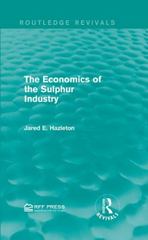Question
Automakers claim that increasing fuel efficiency will not actually contribute to energy independence, so it would be an unnecessary burden on the American people, just
Automakers claim that increasing fuel efficiency will not actually contribute to energy independence, so it would be an unnecessary burden on the American people, just raising the cost of vehicles for no real benefit. They argue that people will buy the same amount of gasoline no matter what. If their cars get better mileage, then people will simply choose to drive more until they use the same total of gasoline. As a result, improving the auto fleet mileage will not reduce consumption of gasoline at all.
Use the consumer choice model to analyze this claim. Let the two goods be x=miles and y=other goods, and examine how a typical customer will respond to an increase in the fuel efficiency of his/her car.
a. Will people drive more if cars become more fuel efficient?
b. Can we be certain that the auto makers are correct?
c. Are there any special conditions you could find that would ensure their analysis is correct? Do you think that/those conditions is/are likely to be true?
Step by Step Solution
There are 3 Steps involved in it
Step: 1

Get Instant Access to Expert-Tailored Solutions
See step-by-step solutions with expert insights and AI powered tools for academic success
Step: 2

Step: 3

Ace Your Homework with AI
Get the answers you need in no time with our AI-driven, step-by-step assistance
Get Started


